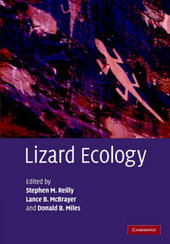
|
Lizard Ecology
Hardback
Main Details
| Title |
Lizard Ecology
|
| Authors and Contributors |
Edited by Stephen M. Reilly
|
|
Edited by Lance B. McBrayer
|
|
Edited by Donald B. Miles
|
| Physical Properties |
| Format:Hardback | | Pages:558 | | Dimensions(mm): Height 255,Width 180 |
|
| Category/Genre | Animal behaviour
Reptiles |
|---|
| ISBN/Barcode |
9780521833585
|
| Classifications | Dewey:595.95 |
|---|
| Audience | | Professional & Vocational | |
|---|
|
Publishing Details |
| Publisher |
Cambridge University Press
|
| Imprint |
Cambridge University Press
|
| Publication Date |
12 July 2007 |
| Publication Country |
United Kingdom
|
Description
The foraging mode of lizards has been a central theme in guiding research in lizard biology for three decades. Foraging mode has been shown to be a pervasive evolutionary force molding the diet, ecology, behavior, anatomy, biomechanics, life history, and physiology of lizards. This 2007 volume reviews the knowledge on the effects of foraging mode on these and other organismal systems to show how they have evolved, over a wide taxonomic survey of lizard groups. The reviews presented here reveal the continuous nature of foraging strategies in lizards and snakes, providing the reader with a review of the field, and will equip researchers with fresh insights and directions for the sit-and-wait vs. wide foraging paradigm. This will serve as a reference book for herpetologists, evolutionary biologists, ecologists and animal behaviorists.
Author Biography
Stephen M. Reilly is professor in the Department of Biological Sciences at Ohio University.
ReviewsReview of the hardback: 'A major strength of the book is the integration of many subfields of ecology and evolutionary biology into a cohesive collection ... this volume serves as a good base to easily determine what remains to be done in the realm of foraging biology ... This publication will certainly be a useful resource for those interested in the evolution of animal foraging and traits associated with different foraging strategies, but it will also appeal to other herpetologists, behavioural ecologists, and evolutionary ecologists.' The Quarterly Review of Biology
|